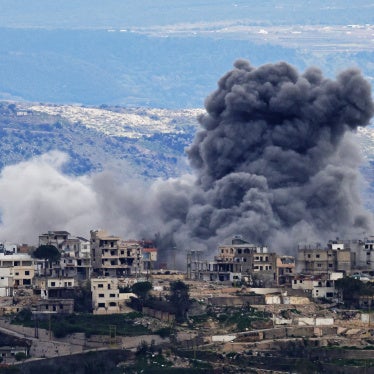Geneva, Switzerland
To: The Ambassadors of the Permanent Missions to the United Nations of Benin, Czech Republic, Djibouti, Hungary, Italy, Jordan, Kuwait, Malaysia, The Maldives, Mauritania, Poland, Qatar, Romania, The Kingdom of Saudi Arabia, and United States of America
Re: Votes on Libya Resolution at the 19th Session of the Human Rights Council
Your Excellency,
The undersgned non-governmental organizations want to express their dismay regarding the results of the vote that toook place during the adoption of the resolution on "Assistance to Libya in the field of Human Rights" (A/HRW/19/L39/Rev.1), at the 19th session of the Human Rights Council on 23rd March 2012.
We are deeply disappointed that your delegation rejected the amendments put forward by Russia, which called on the Transitional Government of Libya to address arbitrary detention and to release those detained or bring them to trials and requested the Office of the High Commissioner for Human Rights to report on the human rights developments in Libya. We are equally disappointed at your delegation’s decision to vote against the proposed Ugandan amendments, which expressed concern about reports of killing and ill-treatment of people of sub-Saharan African origin and encouraged Libya to investigate all violations, including towards members of ethnic minorities and migrants.
For years our organizations have advised States to ensure that the positions they adopt in the Council be informed by the merits of a situation, rather than the politics. In Libya, there are grave and continuing concerns about the human rights situation that warrant the adoption of a strong resolution. The Commission of Inquiry for Libya expressed concern that human rights violations continue to be committed especially by armed militias, and recommended continued monitoring by the Council to ensure the implementation of its recommendations. Yet because several delegations voted against the amendments put forward by Russia and Uganda, the resolution adopted by the Council fails to acknowledge specific violations, to recognize the extent and gravity of ongoing rights abuses, and to include a mechanism to ensure monitoring of the human rights situation by the Council.
Many of the delegations that voted against the amendment have consistently professed the need to support robust and effective action by the Council in response to situations of grave human rights violations, yet when put to the test in Libya, they failed to endorse the very principles they claimed to defend. The vote is particularly disappointing because if reinforces the perceptions of selectivity and double standards in the Council and mistakenly rewards a State.
We are aware of the politics involved as Russia’s tabling of amendments to this resolution was inconsistent with its record of opposing country-specific resolutions. We are also cognizant of the efforts made by several Western delegations to try to convince the Libya delegation to accept the amendments before the resolution was put to the vote. We were informed of the Libya delegation’s stated position that it would withdraw the resolution should the amendments be adopted.
Having carefully considered all of this information we are convinced that delegations that voted against these amendments were mistaken. By rejecting these amendments, your delegation reinforced the intransigence of the Libyan delegation and compromised a principled approach to human rights based on the merits of the case. The decision let down Libyans who continue to suffer human rights abuses and who want their new government to be held to the standards it professes to uphold.
While a cooperative approach should be sought, the first duty of the Council is to ensure the promotion of human rights standards and protection for victims. The resolution on Libya fails to ensure either of these goals sufficiently. Libya’s stated positions that it would have withdrawn the proposed resolution if it included these amendments is, in itself, an alarming indication of its unwillingness to seriously address ongoing human rights violations and cooperate with the HRC. Stronger protection for human rights in Libya is required by the Council and your delegation in the future.
From the beginning of the 19th session, Libya’s closest allies should have made greater efforts to ensure the adoption of a robust resolution, consistent with past practice in the Council. Yet many countries were complacent about Libya’s efforts to reject language that focused on the current abuses in the country and proposed ongoing monitoring. In this respect, the approach adopted by Côte d’Ivoire should have served as a model. By turning a blind eye to the current human rights problems in Libya, including Libya’s lack of will to address these problems, the Council has missed an important opportunity to make a difference on the ground in Libya during a critical period of transition and prove that it wants to reduce selectivity in its work. The position adopted by the GRULAC states (with the exception of Cuba) and Congo in supporting the Russian and Ugandan amendments should have been taken by all delegations. By voting positively, these states confirmed their concern for victims of human rights violations and their faithfulness to the principles of non-selectivity and objectivity. We also commend the more principled stance adopted by the delegations of Botswana, Kyrgyzstan, Angola, Burkina Faso, and Mauritius.
We would like to emphasize that as a Council member, your principal responsibility is to protect human rights and respond effectively and promptly to violations wherever they may occur. We hope that in the future you will work to achieve this aim by ensuring the best possible response by the Council when addressing human rights situations put forward for its consideration. We believe the tenuous situation in Libya, struggling to recover from 42 years of dictatorship and eight months of armed conflict, requires stronger attention by the Council in the months to come, and we will work to ensure this moving forward.
Sincerely,
African Democracy Forum, Asian Forum for Human Rights and Development (Forum Asia), Asian Leagal Resource Centre, Cairo Institute for Human Rights Studies, Centro de Estudios Legales y Sociales (CELS), Commonwealth Human Rights Initiative, Conectas Direitos Humanos, East and Horn of Africa Human Rights Defenders Project, Egyptian Initiative for Personal Rights (EIPR), Human Rights Watch, International Service for Human Rights, Western African Human Rights Defenders Network





